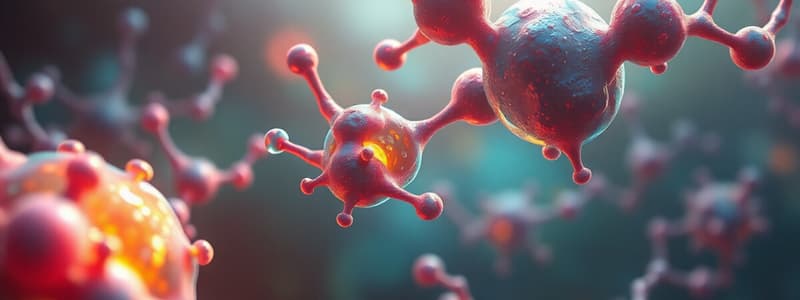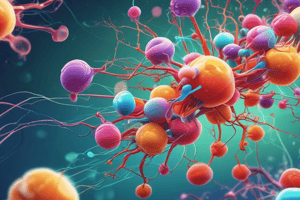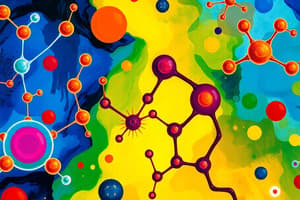Podcast
Questions and Answers
What role do buffers play in biological systems?
What role do buffers play in biological systems?
Which statement accurately describes activation energy?
Which statement accurately describes activation energy?
In the context of energy flow in biological systems, what does bioenergetics primarily study?
In the context of energy flow in biological systems, what does bioenergetics primarily study?
Which biochemical technique is crucial for identifying the absorbance of light by molecules?
Which biochemical technique is crucial for identifying the absorbance of light by molecules?
Signup and view all the answers
In biochemical reactions, what is the significance of redox reactions?
In biochemical reactions, what is the significance of redox reactions?
Signup and view all the answers
What distinguishes the four levels of protein structure?
What distinguishes the four levels of protein structure?
Signup and view all the answers
Which metabolic process requires energy for synthesis?
Which metabolic process requires energy for synthesis?
Signup and view all the answers
Which statement correctly describes the role of enzymes in biochemical reactions?
Which statement correctly describes the role of enzymes in biochemical reactions?
Signup and view all the answers
Which type of biological macromolecule is primarily responsible for genetic information transfer?
Which type of biological macromolecule is primarily responsible for genetic information transfer?
Signup and view all the answers
Which carbohydrate is classified as a disaccharide?
Which carbohydrate is classified as a disaccharide?
Signup and view all the answers
What is the main distinguishing feature of lipids compared to other macromolecule types?
What is the main distinguishing feature of lipids compared to other macromolecule types?
Signup and view all the answers
What is the correct order of stages in cellular respiration?
What is the correct order of stages in cellular respiration?
Signup and view all the answers
Which of the following statements about water is NOT true in the context of biochemistry?
Which of the following statements about water is NOT true in the context of biochemistry?
Signup and view all the answers
Study Notes
Introduction to Biochemistry
- Biochemistry is the study of chemical processes within and relating to living organisms.
- It encompasses areas like structure and function of biological macromolecules (proteins, carbohydrates, lipids, and nucleic acids).
- It also involves the metabolism of these molecules, including cellular respiration, photosynthesis, and other crucial metabolic pathways.
- The field uses principles of chemistry, physics, and biology to unravel the complexities of life at the molecular level.
Biological Macromolecules
-
Proteins:
- Composed of amino acids linked by peptide bonds.
- Have diverse functions, including catalysis, transport, structure, and signaling.
- Structure is determined by the sequence of amino acids and influences function.
- Four levels of protein structure: primary, secondary, tertiary, and quaternary.
-
Carbohydrates:
- Composed of carbon, hydrogen, and oxygen.
- Provide energy and structural support in cells.
- Classified as monosaccharides, disaccharides, and polysaccharides.
- Examples include glucose, fructose, sucrose, and starch.
-
Lipids:
- Diverse group of hydrophobic molecules.
- Include fats, oils, phospholipids, and steroids.
- Important for energy storage, membrane structure, and signaling.
- Fatty acids are the primary building block.
-
Nucleic Acids:
- DNA and RNA are the primary types.
- Carry genetic information.
- Composed of nucleotides with a sugar-phosphate backbone and nitrogenous bases.
- DNA stores genetic information, while RNA carries it out and facilitates protein synthesis.
Metabolism
- Catabolism: Breakdown of complex molecules into simpler ones, releasing energy.
- Anabolism: Synthesis of complex molecules from simpler ones, requiring energy.
-
Cellular Respiration:
- Process of oxidizing glucose to produce energy (ATP).
- Several stages: glycolysis, Krebs cycle, and electron transport chain.
-
Photosynthesis:
- Process of converting light energy into chemical energy.
- Converting carbon dioxide and water to glucose.
-
Enzymes:
- Biological catalysts that accelerate biochemical reactions.
- Specific to their substrates, meaning they catalyze specific reactions.
- Affected by temperature, pH, and concentration.
- Important in regulating metabolic pathways.
Water in Biochemistry
- Water is the most abundant molecule in living organisms.
- Its unique properties, including polarity, high specific heat, and high surface tension, are crucial to life.
- Water is the solvent of life, dissolving many substances in biological systems.
- Water participates in many biochemical reactions.
Other Important Concepts
-
pH:
- Measure of acidity or basicity.
- Important for regulating enzyme activity and cellular processes.
- Buffers help maintain a stable pH.
-
Redox Reactions:
- Transfer of electrons between molecules.
- Important in energy transfer processes like cellular respiration and photosynthesis.
-
Buffers:
- Systems that resist changes in pH.
- Important in maintaining stable pH environments in biological systems.
-
Activation Energy:
- Minimum energy required for a reaction to occur.
- Enzymes lower the activation energy, speeding up reactions.
-
Bioenergetics:
- Study of energy flow within biological systems.
- Including energy transfer in metabolism.
-
Signaling Pathways:
- Series of biochemical reactions involved in transmitting signals within cells.
- Important for cellular responses to internal and external stimuli.
Biochemical Techniques
- Chromatography: Used to separate mixtures of molecules based on their properties.
- Spectrophotometry: Measures the absorbance of light by molecules, crucial for identifying components.
- Gel Electrophoresis: Separates macromolecules (DNA, proteins) by size and charge.
- Mass Spectrometry: Determines the mass-to-charge ratio of molecules.
Studying That Suits You
Use AI to generate personalized quizzes and flashcards to suit your learning preferences.
Description
Explore the fundamentals of biochemistry, focusing on biological macromolecules and their critical roles in living organisms. This quiz covers proteins, carbohydrates, lipids, and nucleic acids, along with their structures and functions. Understand the intricate biochemical processes that sustain life.




